Wichmann (crater)
Wichmann is a bowl-shaped lunar impact crater. It was named after German astronomer Moritz L. G. Wichmann.[1] It is located in the southern half of Oceanus Procellarum on a low plateau formed from a wrinkle ridge, Dorsa Ewing.
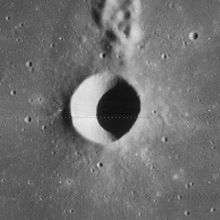 Lunar Orbiter 4 image | |
| Coordinates | 7.5°S 38.1°W |
|---|---|
| Diameter | 10 km |
| Colongitude | 38° at sunrise |
| Eponym | Moritz L. G. Wichmann |
There is a small mountain chain to the north that curves away to the west that is designated Wichmann R; this is most likely the rim of a worn crater that was buried by the lava flow forming the mare. Additional low mountains lie to the south of the plateau on which Wichmann is situated.
Satellite craters
By convention these features are identified on lunar maps by placing the letter on the side of the crater midpoint that is closest to Wichmann.
| Wichmann | Latitude | Longitude | Diameter |
|---|---|---|---|
| A | 7.4° S | 36.9° W | 4 km |
| B | 7.1° S | 39.1° W | 4 km |
| C | 4.7° S | 37.4° W | 3 km |
| D | 5.4° S | 36.0° W | 3 km |
| R | 6.6° S | 39.0° W | 62 km |
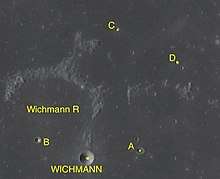
Satellite craters of Wichmann
Gallery
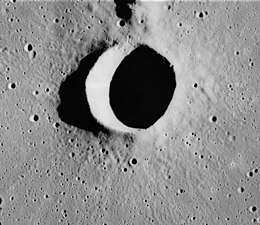 Apollo 16 image
Apollo 16 image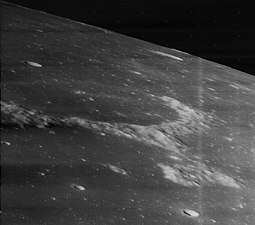 Oblique view of Wichmann R, facing southwest. Wichmann itself is just out of the view to the left. From Lunar Orbiter 3.
Oblique view of Wichmann R, facing southwest. Wichmann itself is just out of the view to the left. From Lunar Orbiter 3.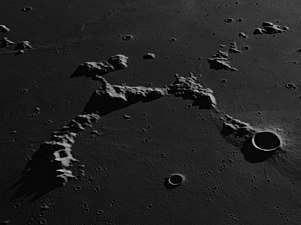 Similar view from Apollo 16
Similar view from Apollo 16
gollark: You would HOPE so.
gollark: My school (not university, I think the equivalent is high school or something elsewhere) is handling it *somewhat* okay, but possibly partly because it would mostly be revision for the (now cancelled) GCSEs anyway at this point.
gollark: Surely at least part of the point of the grades you get from school/whatever is to show that you're actually qualified to do whatever subject it is.
gollark: That sounds like it would basically make the grades for the year meaningless.
gollark: They actually factory-farm alligators to make it.
References
- "Wichmann (crater)". Gazetteer of Planetary Nomenclature. USGS Astrogeology Research Program.
- Andersson, L. E.; Whitaker, E. A. (1982). NASA Catalogue of Lunar Nomenclature. NASA RP-1097.CS1 maint: ref=harv (link)
- Bussey, B.; Spudis, P. (2004). The Clementine Atlas of the Moon. New York: Cambridge University Press. ISBN 978-0-521-81528-4.CS1 maint: ref=harv (link)
- Cocks, Elijah E.; Cocks, Josiah C. (1995). Who's Who on the Moon: A Biographical Dictionary of Lunar Nomenclature. Tudor Publishers. ISBN 978-0-936389-27-1.CS1 maint: ref=harv (link)
- McDowell, Jonathan (July 15, 2007). "Lunar Nomenclature". Jonathan's Space Report. Retrieved 2007-10-24.CS1 maint: ref=harv (link)
- Menzel, D. H.; Minnaert, M.; Levin, B.; Dollfus, A.; Bell, B. (1971). "Report on Lunar Nomenclature by the Working Group of Commission 17 of the IAU". Space Science Reviews. 12 (2): 136–186. Bibcode:1971SSRv...12..136M. doi:10.1007/BF00171763.CS1 maint: ref=harv (link)
- Moore, Patrick (2001). On the Moon. Sterling Publishing Co. ISBN 978-0-304-35469-6.CS1 maint: ref=harv (link)
- Price, Fred W. (1988). The Moon Observer's Handbook. Cambridge University Press. ISBN 978-0-521-33500-3.CS1 maint: ref=harv (link)
- Rükl, Antonín (1990). Atlas of the Moon. Kalmbach Books. ISBN 978-0-913135-17-4.CS1 maint: ref=harv (link)
- Webb, Rev. T. W. (1962). Celestial Objects for Common Telescopes (6th revised ed.). Dover. ISBN 978-0-486-20917-3.CS1 maint: ref=harv (link)
- Whitaker, Ewen A. (1999). Mapping and Naming the Moon. Cambridge University Press. ISBN 978-0-521-62248-6.CS1 maint: ref=harv (link)
- Wlasuk, Peter T. (2000). Observing the Moon. Springer. ISBN 978-1-85233-193-1.CS1 maint: ref=harv (link)
| Wikimedia Commons has media related to Wichmann (crater). |
This article is issued from Wikipedia. The text is licensed under Creative Commons - Attribution - Sharealike. Additional terms may apply for the media files.